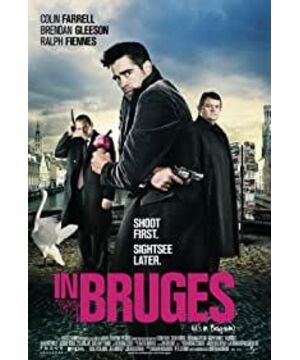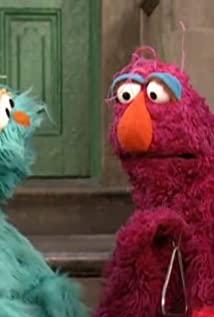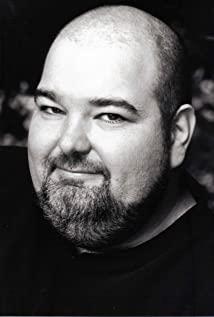This is a story that should be classified as a fairy tale, although it is black.
Lei and Ken are two cooperating killers, Lei is young and Ken is old. During a mission, Lei killed a child by mistake. Since then, he has fallen into self-blame and has been burdened with a heavy psychological burden. This time, the two of them received an assignment to go to Bruges, stay in a hotel room that had been booked, go shopping, and wait for the boss Harry to call.
They wandered around and admired the buildings left over from the Middle Ages, dreamlike fog, beautiful river channels, and swans roaming on it in Bruges, a fairytale city. Ken was happy in it, but Ray was not interested.
The call finally came, called Ken, let him kill mine, "stop his guilt." But when Ken was ambivalent and prepared to secretly execute the order, he caught up with Lei because he couldn't get past his inner guilt, and finally decided to commit suicide by drinking a bomb.
Ken let Lei go and asked him to "save a boy" to redeem himself for killing a boy, while he himself stayed and waited for the punishment of the boss Harry.
Harry, who has always been guided by the principle of "adhering to principles", really came. When the film was near the end, he really said the reason why he insisted on killing mine "a person who kills a child cannot but be punished." He wanted to kill and save mine. They all felt that they were guilty. They wanted to stick to the principle of being good in their hearts. They sacrificed their lives for this. However, after Harry punished Ray, he found that he had killed one by mistake. The boy—actually an adult dwarf—sticks to his own principles and commits suicide.
"Principles must be adhered to" is a theme repeatedly repeated by several people from the beginning to the end of the film. Killers are doing crimes, but they have their own view of good and evil-they can't beat women and they can't kill children. They firmly believe that the people they killed are not good people in the first place, so killing people does not make them feel guilty, but only insignificance makes them despise and make them repent.
Their values are those of the Middle Ages. They are bad guys in the modern sense, but they are polite, knightly, and treat their opponents frankly and equally. And each of them has a soft heart. Harry wanted to kill Thunder, but arranged a trip to Bruges for them, because he had been here when he was a child, and he had a good impression of it. He hoped that Thunder could enjoy happiness before he died; Jumped down from the top of the tower, and before jumping, in order to avoid hitting the innocent, he threw coins to scare the tourists away; Ray would beat someone for an offensive word, but would watch the children play in the park and save his savings. For the pregnant hotel proprietress, let her take care of her children... The most touching part was the duel between Harry and Ray in the hotel. For fear of hurting the innocent proprietress, the two chose to leave the hotel at the same time.
The three "bad guys" all died in the end, the ones who were killed, and the ones who prosecuted themselves. Compared with these bad guys, those so-called good guys seem much more wretched. Bald uses blackmail to steal money and informs to report his revenge for being blinded. Canadians seem to be educated, but they are the first to speak inferiorly and then rely on the police to claim their rights. It is this huge contrast that makes people see a few killers who adhere to principles and are kind and magnanimous in their hearts. When they die one by one, they will feel sad that the morals belonging to the Middle Ages fade with them. They would rather have such "bad guys." And don't those "good guys" who are cowardly and trivial.
The bloody story is staged in a fairy tale-like place, the sparkling stone streets, the evening lights, the mist that evaporates in the air, the medieval buildings, and the beautiful piano music, just like the medieval temperament of the three killers. Same, "Knowing that I am awake, but I feel like I am in a dream" (line in the play). The contrast between the scenery and the times is exactly the contrast between the hearts of the three of them and the contemporary people.
When Ken said to Harry, "I love you, you have always been honest", I still couldn't understand this sentence. I finally understood the meaning of this sentence when he thundered for the sake of the hotel proprietress and swallowed bombs because he thought he had killed the child. Harry is really worthy of his love. Although the three of them are kind and principled, Harry is the one who insists on faith most among them, insisting to the point of dogma. This also explained that when he received Ken's call and determined to go to Bruges to kill, the director arranged for him to say goodbye to the children gently and apologize to his wife for the momentary rudeness. What a good man, he can almost be called sublime. And the passing of such a person, how could it not be regrettable.
The actor playing Harry is Ralph Fiennes, a neat man with aristocratic temperament, who perfectly interprets this killer boss with medieval sentiment. At the moment of the suicide, he took the gun out of his mouth and repeated "You must adhere to the principle", and then he plugged it back and shot it. It was very British and humorous, but it made people unable to laugh and could not help tears. drop down.
Fan Wuqi cut off his head for Jing Ke's righteous deeds, and Gao Jianli blinded his eyes for his friends-these feats of devaluing righteousness and despising death belonged to ancient times forever. It turned out that foreign countries have the same sigh.
A place like a fairy tale, with an atmosphere like a fairy tale. All these arrangements are telling everyone: this is just a fairy tale, because such a killer, in such an era, may not survive the age to do these things.
View more about In Bruges reviews











